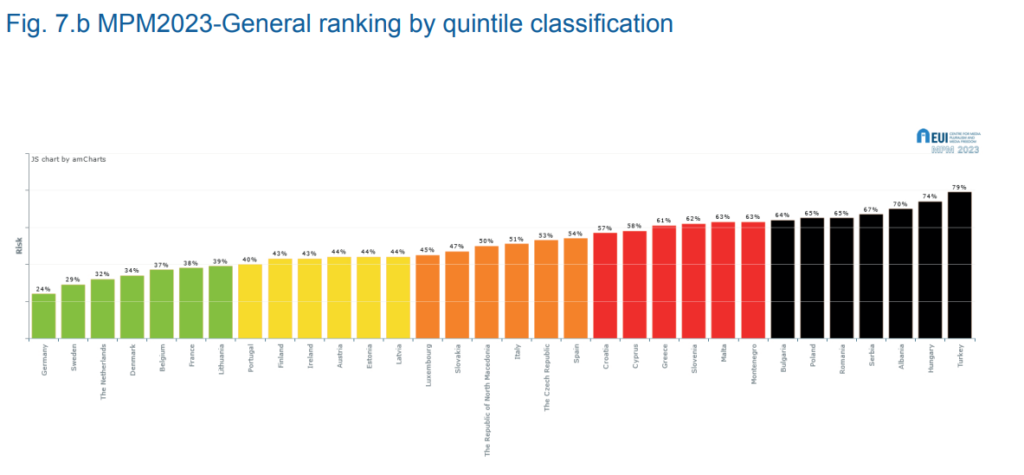Now in its 10th year, the Media Pluralism Monitor remains an unparalleled source of robust evidence on the threats facing European media
Florence, 30 June 2023 – Media pluralism threats pervade every European country, without exception.
The newly published study by the Centre for Media Pluralism and Media Freedom at the European University Institute brings to light the persistent risks encountered by journalists, including threats to their safety, diminishing resources for investigative reporting, and an alarming rise in online harassment and attacks. These challenges, coupled with the disruptive impact of the digital transformation, continue to pose a grave danger to the fabric of media pluralism in Europe.
Discover the 2023 Media Pluralism Monitor Report
“Our Media Pluralism Monitor clearly demonstrates the current fragility of media pluralism in Europe”, said Professor Pier Luigi Parcu, Director of the CMPF. “There is ample room for improvement when it comes to media independence from commercial and political influence, and to the underrepresentation of women and minority groups in the media” he noted.
“The most recent development at the EU level in this field has been the proposal for a European Media Freedom Act,” Parcu pointed out. “We fully share the aim of championing quality journalism and preserving media pluralism as a pillar of our democracy of the proposed regulation. If approved, it could potentially have a profound impact on safeguarding media pluralism and fostering democratic values.”
The Media Pluralism Monitor is a scientific tool first implemented in 2013 by the Centre for Media Pluralism and Media Freedom with the aim to inform policymakers, researchers, and civil society about the risks for media pluralism in the European media systems. It does so through research, analysis, and the comparison of country data in four areas: fundamental protection, market plurality, political independence, and social inclusiveness.
The report further breaks down the data to show the difference between the risk level in the traditional media indicators and in the digital environment, highlighting a greater risk in the digital dimension, such as the use of digital surveillance on journalists, online harmful speech, and lack of transparency in political advertising on online platforms.
This year’s report marks the second time that the Media Pluralism Monitor introduces a general ranking of countries based on their average risk levels across the four main areas. This is a relatively new endeavor aimed at providing a more nuanced overall assessment of the European media ecosystem.

“The aim of the general ranking is to provide an overview of the health of media pluralism in European countries and candidates,” said Elda Brogi, scientific coordinator of the project. “We encourage readers to delve deeper into the underlying causes of the risk levels in each country, as they will discover a comprehensive analysis based on over 200 indicators and implemented by a diverse network of national experts, ensuring the highest scientific standards.
“Through the Media Pluralism Monitor exercise, our goal is to provide policymakers with robust, scientific, and independent evidence,” said Professor Brogi.
The complete report, along with country-specific reports, is accessible on the CMPF website.
The Media Pluralism Monitor (MPM) is an independent project, co-funded by the European Commission based on financial allocations from the European Parliament, implemented by the Centre for Media Pluralism and Media Freedom since 2013.
Based at the Robert Schuman Centre of the European University Institute in Florence, the Centre for Media Pluralism and Media Freedom develops robust and relevant research on media freedom and media pluralism with the aim to support to the international, European, and national policy making process.
The European University Institute is the leading institute in Europe dedicated to social sciences and humanities. Founded in 1972 by the six original members of the then European Communities, the EUI has earned a reputation as a transnational hub of research and higher learning.
Media requests:
Giulia Giannasi, Communications Officer: giulia.giannasi@eui.eu + 39 3420587371
